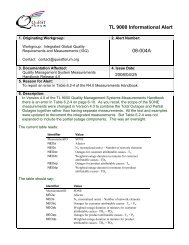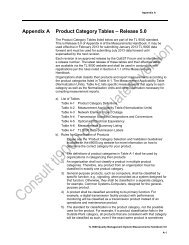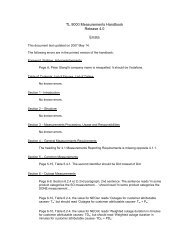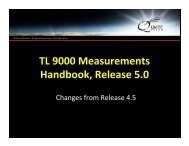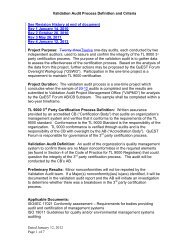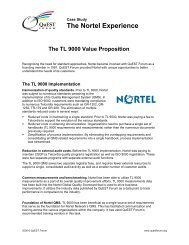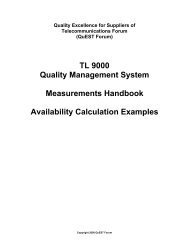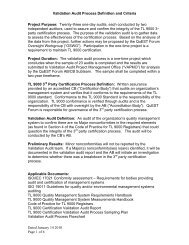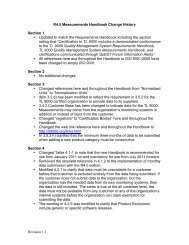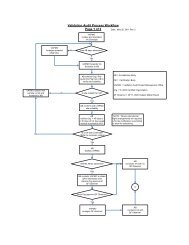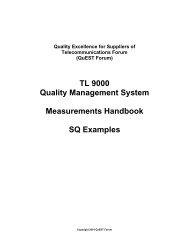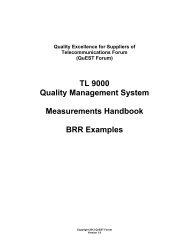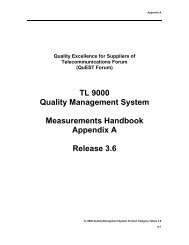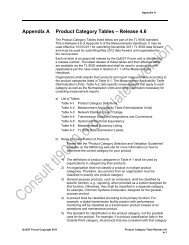Auditor Refresher for TL 9000 Measurements Advisories
Auditor Refresher for TL 9000 Measurements Advisories
Auditor Refresher for TL 9000 Measurements Advisories
Create successful ePaper yourself
Turn your PDF publications into a flip-book with our unique Google optimized e-Paper software.
QuEST Forum<br />
Data Submission<br />
Receipt<br />
<strong>Advisories</strong><br />
(Warnings)<br />
Copyright © 2014 QuEST Forum
Presentation Objective<br />
Improve consistency of <strong>TL</strong> <strong>9000</strong> measurements by:<br />
• Communicating QuEST Forum expectations to Certification Body (CB)<br />
<strong>Auditor</strong>s<br />
• Review of CB <strong>Auditor</strong> Responsibilities in <strong>TL</strong> <strong>9000</strong> <strong>Measurements</strong><br />
Assessment<br />
• Presenting a method that CB <strong>Auditor</strong>s may use in the evaluation of<br />
Data Submission Receipts (DSRs)<br />
• Assuring data integrity once a <strong>TL</strong> <strong>9000</strong> measurement is flagged with<br />
an ADVISORY<br />
• Communicating the deployment of the Advisor software application<br />
and the DSR advisories<br />
Copyright © 2014 QuEST Forum
Presentation Overview<br />
• Evaluating <strong>TL</strong> <strong>9000</strong> <strong>Measurements</strong> Process<br />
• Reminder of CB <strong>Auditor</strong> Responsibilities in <strong>Measurements</strong> Assessment<br />
• Validating Scope, Specialty Area and Product Category<br />
• The Content of a Data Submission Receipt (DSR)<br />
• The Layout of a Data Submission Receipt (DSR)<br />
• Items <strong>for</strong> an CB <strong>Auditor</strong> to evaluate on a Data Submission Receipt (DSR)<br />
• The “Advisor” software application, overview and deployment<br />
• <strong>Measurements</strong> <strong>Advisories</strong><br />
• Assuring data integrity <strong>for</strong> any measurement flagged with an Advisory<br />
• Expanding deployment of the Advisor software application<br />
• Where to submit questions on the Advisor application, <strong>Advisories</strong> or application<br />
deployment<br />
Copyright © 2014 QuEST Forum
Terminology<br />
For simplicity and brevity the following terms are used consistently through<br />
this presentation<br />
“Organization”<br />
“MRS”<br />
“DSR”<br />
“ADVISORY”<br />
“Pass”<br />
“EXEMPT”<br />
– the organization you are auditing<br />
– the <strong>TL</strong> <strong>9000</strong> <strong>Measurements</strong> Repository System<br />
– Data Submission Receipt<br />
– Notification included on the DSR issued by the<br />
<strong>TL</strong> <strong>9000</strong> Administrator, this is an indication that<br />
there is something in the data submission that<br />
requires investigation.<br />
– Notification on the DSR that the measurements<br />
submission has passed.<br />
– indication that the organization will not be<br />
submitting the indicated measurement as<br />
justified in the <strong>TL</strong> <strong>9000</strong> <strong>Measurements</strong> Handbook<br />
under “Data Submissions and Exemptions”<br />
“CB”<br />
– Certification Body, also called a Registrar<br />
Copyright © 2014 QuEST Forum
Expectations of <strong>TL</strong> <strong>9000</strong> Stakeholders<br />
It is essential that CB auditors examine the <strong>TL</strong> <strong>9000</strong> measurements collection, validation, analysis and reporting<br />
processes as a system. All the pieces must connect, and play their part in continual improvement.<br />
CB auditors must keep in mind two ‘communities’ of <strong>TL</strong> <strong>9000</strong> stakeholders: the Organization’s customers, and its<br />
competitors. For perhaps differing reasons, both communities expect the measurements to be fair, accurate and<br />
comparable.<br />
<strong>TL</strong> <strong>9000</strong> stakeholders expect <strong>TL</strong> <strong>9000</strong> Certification to imply assurance of the following key factors:<br />
• The Organization’s processes are repeatable and predictable, and contain no gaps that might<br />
compromise telecom service quality<br />
• The <strong>TL</strong> <strong>9000</strong> measurements reported to the MRS by the Organization comply with the intent of the<br />
Counting Rules, are accurate, and are comparable with those reported by other Organizations in the<br />
same product category<br />
• The Organization’s management team and employees actively use the <strong>TL</strong> <strong>9000</strong> measurements to drive<br />
systematic continual improvement of per<strong>for</strong>mance<br />
This presentation speaks to one piece of the <strong>Measurements</strong> Process implemented<br />
in all <strong>TL</strong> <strong>9000</strong> certified firms. The analysis of Data Submission Receipts (DSRs) and<br />
the evaluation of data integrity ADVISORIES noted on DSRs.<br />
Copyright © 2014 QuEST Forum
CB auditors responsibility in measurements process assessment - review<br />
As Documented in the QuEST Forums’ Code of Practice <strong>for</strong> <strong>TL</strong> <strong>9000</strong> Registrars<br />
1. The CBs shall verify that the organization has a documented system in place that covers:<br />
a. <strong>Measurements</strong> collection: Much, if not all, of <strong>Measurements</strong> Handbook 5.0 Sections 3.5.2 subsections a, c-j, and the<br />
collection/submission portion of b, can be verified prior to going on-site.<br />
b. <strong>Measurements</strong> validation, in accordance with <strong>Measurements</strong> Handbook 5.0 section 3.5.2. The CB shall audit to the depth<br />
necessary to assure effective implementation of <strong>TL</strong> <strong>9000</strong> requirements (see item 8 below).<br />
c. <strong>Measurements</strong> reporting, in accordance with Requirements Handbook 5.5 section 5.4.1.c.1 and <strong>Measurements</strong><br />
Handbook 5.0 sections 3.2 subsections a and b.<br />
2. Ensure the <strong>TL</strong> <strong>9000</strong> measurements are used systemically by the organization. This includes reviews by management,<br />
quality/strategic objective setting <strong>for</strong> continual improvement, result/trend reviews, and corrective action plans <strong>for</strong> any<br />
per<strong>for</strong>mance deviating from the organization’s defined quality/strategic objectives, in accordance with Requirements<br />
Handbook 5.5 section 8.5.2 and its associated notes and <strong>Measurements</strong> Handbook 5.0 sections 3.1.a, 3.5.2 subsections i<br />
and j.<br />
3. If any measurements are identified as ”EXEMPT”, as defined in <strong>Measurements</strong> Handbook 5.0, sections 3.2.b and 4.2.8.b, the<br />
documented rationale <strong>for</strong> the exemption shall be reviewed and accepted as valid by the CB auditor. The CB auditor shall<br />
ensure this documentation has been available <strong>for</strong> review if requested by the organization’s customers. The QuEST Forum<br />
requires the claimed exemption also be noted on the organization's registration profile.<br />
4. The CB auditor shall verify that measurements are being used in customer/organization relationship, in accordance with<br />
<strong>Measurements</strong> Handbook 5.0 section 3.1.b.<br />
Copyright © 2014 QuEST Forum
CB auditors responsibility in measurements process assessment - review<br />
As Documented in the QuEST Forums’ Code of Practice <strong>for</strong> <strong>TL</strong> <strong>9000</strong> Registrars<br />
5. The CB auditor shall verify that measurements are reported to the <strong>Measurements</strong> Administrator [UTD] in full accordance with<br />
the <strong>Measurements</strong> Handbook 5.0 sections 3.1.c, 3.2 subsections a and b, 3.5.2 subsections b - g, and 3.5.2.k. This would<br />
include a review of the Data Submission Reports <strong>for</strong>:<br />
a. “Passed” designation<br />
b. “EXEMPT” designations<br />
c. Any notes or advisories on the Data Submission Reports; and<br />
d. Probations<br />
e. Any claimed exemptions are documented and valid<br />
f. All items shown “EXEMPT” on the Data Submission Report are in full compliance with the Handbook and item 3 above<br />
g. There is a Data Submission Receipt <strong>for</strong> every product category listed in the organization’s scope <strong>for</strong> each month and each<br />
match the organization’s registration options (Hardware, Software, and/or Services) as appropriate to the product<br />
category..<br />
6. If current per<strong>for</strong>mance shows an undesirable deviation from the organization’s defined quality/strategic objectives <strong>for</strong> <strong>TL</strong> <strong>9000</strong><br />
<strong>Measurements</strong>, the CB auditor shall verify that corrective action has/is being taken, is documented, and progress is being<br />
tracked, in accordance with <strong>Measurements</strong> Handbook 5.0 sections 3.1.a, 3.5.2 subsections i and j, and 3.5.5.c, and<br />
Requirements Handbook 5.0 section 8.5.2 and associated notes.<br />
The CB auditor shall verify that measurements collected are consistent with scope of registration, registration option [HSV], and<br />
product category, in accordance with <strong>Measurements</strong> Handbook 5.0 sections 3.2 subsections a and b, and 3.5.2.c. This can<br />
be done prior to the on-site activities.<br />
Copyright © 2014 QuEST Forum
CB auditors responsibility in measurements process assessment - review<br />
As Documented in the QuEST Forums’ Code of Practice <strong>for</strong> <strong>TL</strong> <strong>9000</strong> Registrars<br />
CB auditors shall review the actual data submissions, verifying proper implementation of the counting rules <strong>for</strong> required<br />
measurements. This check would also review data consistency covering a minimum one-year period (an exception to this is<br />
when a certified organization and/or new product have been certified <strong>for</strong> less than one year. For this case, data shall be<br />
reviewed <strong>for</strong> at least as long as official submissions have been generated. Also note – the only other exception is <strong>for</strong> the<br />
initial registration audit. For this case, only the single pre-registration data submission needs to be verified). This shall be<br />
done to fulfill <strong>Measurements</strong> Handbook 5.0 requirement 3.3.1.a and in accordance with sections 3.5.2 subsections a and b.<br />
• While the sample size <strong>for</strong> the above requirement is left up to the auditing organization, it is expected that the depth of<br />
assessment <strong>for</strong> the sampled measurements assures accurate and comprehensive calculation, counting rules, reporting<br />
mechanisms, and validation of the measurements.<br />
CB auditors shall confirm that the registration in<strong>for</strong>mation (i.e. scope and product category) contained in the RMS is current and<br />
accurate during each assessment, to support the verification of <strong>Measurements</strong> Handbook 5.0 sections<br />
• 3.4.1 and 3.5.2.c. This can be started prior to the on-site activities.<br />
CB auditors shall confirm that the product categories chosen by the organization are correct <strong>for</strong> their products, in accordance<br />
with <strong>Measurements</strong> Handbook 5.0 section 3.5.2.c. This can be done prior to the on-site activities.<br />
Copyright © 2014 QuEST Forum
Evaluating the <strong>TL</strong> <strong>9000</strong> measurement process - review<br />
Here are the considerations to keep in mind when auditing measurements processes:<br />
• Does the organization have a systematic, repeatable process <strong>for</strong> collecting the data?<br />
• Does the collection system (both automated and manual elements) include all applicable<br />
data, and all relevant counting rules?<br />
• Although organizations work to make data collection error-proof, mistakes can still<br />
happen. What steps does the organization take to validate data? (Note that it might<br />
validate data after analysis, especially if the processes are automated and the chances of<br />
error small: there is no requirement to follow the process diagram literally, it’s there just<br />
to illustrate the concept.)<br />
• Are records of data validation maintained?<br />
• How are data analyzed? How are trends identified and reported? How does the<br />
organization assure that reported trends are statistically significant – or at least, deserving<br />
of the investment in corrective action.<br />
• How are results reported<br />
• To the MRS? On time? Accurate?<br />
• To the organization? To the people who have the authority and responsibility to<br />
take action?<br />
• To customers?<br />
Bad<br />
Collect<br />
Validate<br />
Good<br />
Analyze<br />
Report – to MRS,<br />
Organization and<br />
Customers if required<br />
Copyright © 2014 QuEST Forum
How to validate product category and scope - review<br />
Begin detailed auditing of the Organization’s <strong>TL</strong> <strong>9000</strong> measurements processes by validating its<br />
product category (or categories) against its Scope of Registration.<br />
• Are all products and services produced within the scope of registration identified ?<br />
• Are they mapped into the correct product categories?<br />
• Does the organization, truly understand the product category descriptions? If not, double<br />
check with a subject matter expert.<br />
• Where more than one product category might apply, has the organization chosen the<br />
category which is of primary concern to customers?<br />
• Have the Hardware, Software and Service specializations been correctly identified?<br />
• If software or services are excluded, yet part of the product, is the exclusion clear to<br />
customers from the wording of the scope of registration?<br />
• For each product category:<br />
• Do the measurements reported include all products which fall within the category?<br />
(Aside from new products less than 6 months after GA.)<br />
• Is the customer base <strong>for</strong> measurements reporting established? The customer base<br />
will change over time: reporting must be consistent and systematic, with the<br />
customer base selected on criteria which include willingness to supply data, and<br />
which exclude consideration of the data (results) themselves.<br />
• Further in<strong>for</strong>mation on the correct selection of a product category may be found in the<br />
document “Product Category Selection and Validation Guidelines” available on the<br />
tl<strong>9000</strong>.org web site.<br />
Copyright © 2014 QuEST Forum
Example of a Data Submission Receipt<br />
<strong>TL</strong><br />
<strong>9000</strong><br />
Data<br />
Submission<br />
Receipt<br />
NOTICE<br />
This report was created by the <strong>Measurements</strong> Repository<br />
System at the University of Texas at Dallas. It satisfies<br />
requirement of 3.5.2.d of the <strong>TL</strong> <strong>9000</strong> Quality Management<br />
System <strong>Measurements</strong> Handbook, Release 5.0<br />
/signed/<br />
Richard F. Morrow<br />
<strong>TL</strong> <strong>9000</strong> Administrator<br />
Registration In<strong>for</strong>mation<br />
Registration ID<br />
Product Category Table 4.0<br />
Product Category 3.3.1<br />
Product Category Name<br />
Base Station Equipment<br />
Product/Location<br />
Click here<br />
to see the entire DSR<br />
Copyright © 2014 QuEST Forum
Items to evaluate on a DSR<br />
It is important that the CB auditor evaluate DSRs <strong>for</strong> each product category that the organization<br />
is registered <strong>for</strong>. While sampling is considered an acceptable practice, looking at all of the DSRs<br />
<strong>for</strong> data submitted since the last audit will not take the CB auditor much time and it will give a<br />
more complete picture of the effectiveness of the data submission process.<br />
Most organizations are certified to <strong>TL</strong> <strong>9000</strong> in only one or two product categories, hence looking<br />
at all the DSRs <strong>for</strong> the previous 6 months would require the review of 6-12 records, which is a<br />
small sample <strong>for</strong> evaluating most processes.<br />
Look at:<br />
Look <strong>for</strong>:<br />
1. Product Category Match to the certificate of Registration<br />
2. Product Category Table Current at the time of submission<br />
3. Date of Submission On time submission<br />
4. Exempted <strong>Measurements</strong> Reasonable rational <strong>for</strong> exemption<br />
5. Submission Status Pass<br />
6. <strong>Advisories</strong> Investigation, RCA, Data Resubmission if necessary<br />
Not finding the expected results is reason <strong>for</strong> further investigation and possible non-con<strong>for</strong>mity.<br />
Copyright © 2014 QuEST Forum
<strong>Measurements</strong> <strong>Advisories</strong> (page 1)<br />
QuEST Forum strives to continually improve the value of the data provided through <strong>TL</strong> <strong>9000</strong> Per<strong>for</strong>mance<br />
Data Reports, which include industry statistic trends (Industry Average, Monthly Average, Best-in-Class,<br />
Worst-in-Class) as applicable <strong>for</strong> each product category and <strong>TL</strong> <strong>9000</strong> measurement. The more accurate<br />
and complete the data, the more useful it is to <strong>TL</strong> <strong>9000</strong> certified organizations and QuEST Forum<br />
members.<br />
A QuEST Forum initiative to further enhance data entry checking to identify and correct potential data<br />
errors be<strong>for</strong>e inclusion in the <strong>Measurements</strong> Repository System maintained by The University of Texas<br />
at Dallas, was completed in 2009. The result of this initiative was an “Advisor” software application<br />
that notifies <strong>TL</strong> <strong>9000</strong> data submitters with “advisories” indicating a potential data integrity issue that<br />
should be investigated. The existence of an advisory does not prevent the data from being successfully<br />
submitted. However, Organizations are expected to review any advisories identified and verify<br />
integrity of the submitted data. If errors are found, the Organization’s data is required to be corrected<br />
and resubmitted. Also, during registration and surveillance audits, the Certification Body will be<br />
expected to follow-up with the organization to insure data integrity, as appropriate, <strong>for</strong> any<br />
measurement flagged with an advisory.<br />
Copyright © 2014 QuEST Forum
<strong>Measurements</strong> <strong>Advisories</strong> (page 2)<br />
The “Advisor” checks look at data across measurements within submissions and across submissions over time to better<br />
validate the integrity of the organization’s submission. <strong>Advisories</strong> will be highlighted on the summary status of Data<br />
Submission Receipts (DSRs). Each advisory is assigned an integer identifier, and is briefly described at the end of the DSR.<br />
Some advisories may be common to all measurements , while others may apply to certain measurements. After<br />
investigation of a potential problem indicated by an advisory, it is very possible that the organization may find the data is<br />
indeed correct and no resubmission is required. For example, when multiple measurements in the same submission have<br />
the same Normalization Unit (NU) defined in Table A-3 of the Product Category Table, if the measurement submission<br />
includes differing values <strong>for</strong> the denominators (i.e. NU’s) <strong>for</strong> those measurements, an advisory will be generated.<br />
However, this difference may be legitimate (e.g. <strong>for</strong> NPR and SONE where in a particular product category customers<br />
don’t report outage data, but do report problems). In cases where advisory investigation does identify a problem, the<br />
organization will correct it, resubmit and maintain records of this process <strong>for</strong> review in registration and surveillance<br />
audits.<br />
More detailed in<strong>for</strong>mation on the <strong>Advisories</strong> can be found in the paper referenced on page:<br />
http://tl<strong>9000</strong>.org/alerts/data_submissions.html<br />
Copyright © 2014 QuEST Forum
The Advisor software Application<br />
Overview<br />
The Advisor software application is managed by the <strong>TL</strong> <strong>9000</strong> Administrator under the direction<br />
of QuEST Forum <strong>Measurements</strong> SMEs. The objective of the application is to assist in ensuring<br />
the integrity of QuEST Forum Per<strong>for</strong>mance Data. It does so by indicating advisories against a<br />
particular measurement and making an indication on the DSR, which looks something like this:<br />
NEOep Ok, Ok- Advisory #11<br />
Each advisory indicates an situation in the submitted data that may or may not be correct. The<br />
advisories flag submitted data <strong>for</strong> a specific measurement that will need to be investigated. If in<br />
error it will need to be corrected and resubmitted. For example, Advisory #11 says “ the data<br />
submitted was 80% of the lowest value submitted in the last 11 months” <strong>for</strong> that specific<br />
measurement, indicating either that the data submitted was in error or that there has been<br />
some real cause <strong>for</strong> significant change in the data . A complete list of the DSR advisories and<br />
their meaning is included later in this presentation.<br />
Copyright © 2014 QuEST Forum
<strong>Measurements</strong> <strong>Advisories</strong><br />
Advisory # 1 - The calculated Measurement over the<br />
smoothed period is perfect – no longer applied as of<br />
August 2011<br />
Advisory # 2 - This submission is the same as month,<br />
year<br />
Advisory # 3 - Normalization Units differ across<br />
measurements that should be the same per Table A-2<br />
– no longer applied as of July 2014<br />
Advisory # 4 - Normalization Units changed greater<br />
than 25% from the prior month<br />
Advisory # 5 - Data Element >150% of the highest<br />
value reported over the previous 11 months<br />
Advisory # 6 - Data Element 125% of the highest<br />
value reported over the previous 11 months<br />
Advisory # 8 - Data Element 120% of the highest value<br />
reported over the previous 11 months<br />
Advisory # 11 - Data Element 120% of the highest value<br />
reported over the previous 11 months and is 3x the<br />
average value in the same 11 months – reduced from 4x<br />
as of August 2011<br />
Advisory # 13 - Data Element >125% of the highest value<br />
reported over the previous 11 months and is 3x the<br />
average value in the same 11 months – reduced from 4x<br />
as of August 2011<br />
Advisory # 14 - Normalization Units are the same across<br />
measurements that should be different per Table A-2<br />
Advisory # 15 - “Exempt” has been submitted <strong>for</strong> a<br />
measurement not listed as exempt on the organization’s<br />
<strong>TL</strong> <strong>9000</strong> profile - added August 2011<br />
For the current list see DSR <strong>Advisories</strong> referenced on page: http://tl<strong>9000</strong>.org/alerts/data_submissions.html<br />
Copyright © 2014 QuEST Forum
<strong>Measurements</strong> <strong>Advisories</strong> – Added November 2014<br />
Advisory # 16 - Downtime reported less than minimum expected<br />
Advisory # 17 - Downtime reported less than minimum expected<br />
Advisory # 18 - Outage frequency reported is less than minimum<br />
expected<br />
Advisory # 19 - Outage frequency reported is less than minimum<br />
expected<br />
Advisory # 20 - NPRs should normally be greater than NEOs<br />
Advisory # 21 - NEOs and SOs should normally be equal<br />
Advisory # 22 - Downtime reported less than minimum expected<br />
Advisory # 23 - Outage frequency reported is less than minimum<br />
expected<br />
Advisory # 24 - Input value greater than 95% of maximum value<br />
expected<br />
This list of advisories is current as of July 28, 2014<br />
For the current list see DSR <strong>Advisories</strong> referenced on page: http://tl<strong>9000</strong>.org/alerts/data_submissions.html<br />
Copyright © 2014 QuEST Forum
What is expected of CB <strong>Auditor</strong>s?<br />
Adhere to the QuEST Forum Code of Practice <strong>for</strong> <strong>TL</strong> <strong>9000</strong> Registrars<br />
Assure there is a documented system in place to collect, validate and report <strong>TL</strong> <strong>9000</strong> measurements<br />
Investigate and validate that the system in place is implemented and effective<br />
Ensure that the rational <strong>for</strong> all measurements exceptions are valid<br />
Verify that Scope and Product Categories are appropriate <strong>for</strong> the Registration<br />
Ensure that measurements submissions are made <strong>for</strong> all product categories under the scope of registration<br />
Ensure that measurements submissions are made on time<br />
Understand measurements advisories<br />
Ensure that all measurements advisories are thoroughly investigated<br />
Copyright © 2014 QuEST Forum
DSR Advisory Details<br />
Advisory # 1 - the calculated Measurement over the<br />
smoothed period is perfect<br />
Advisory # 2 - This submission is the same as<br />
month, year<br />
•Note, Advisory 1 applied to all product categories and all<br />
measurements prior to August 2011. It is no longer applied.<br />
There is a possibility that this data has been submitted in<br />
error, since the data submitted was an exact duplicate of<br />
previous data submission within the last 11 months<br />
Note, Advisory 2 applies to all product categories. It<br />
determines if the current submission is an exact copy of a<br />
prior submission <strong>for</strong> another month<br />
Copyright © 2014 QuEST Forum
DSR Advisory Details<br />
Advisory # 3 - Normalization Units differ across<br />
measurements that should be the same per Table<br />
A-2<br />
Using Problem Reports, Outage and Return Rates as an<br />
example:<br />
•Considering Product Category 1.2.9.2 - “Edge Routers”<br />
•Utilizing Table A-2 “<strong>Measurements</strong> Applicability Table<br />
(Normalized Units) to identify the normalization units <strong>for</strong><br />
each measurements<br />
•The same normalization unit is identified <strong>for</strong> each of the<br />
above measurements, network elements (or routers)<br />
•This advisory against this measurement is asking the<br />
organization to evaluate if the data submitted is correct<br />
•Is the normalization <strong>for</strong> the subject measurement truly<br />
different or has a measurements submission error been<br />
made?<br />
Advisory # 4 - Normalization Units changed greater<br />
than 25% between consecutive months<br />
Using Problem Reports (NPR) as an example:<br />
•Considering Product Category 1.2.9.2 - “Edge Routers”<br />
•NPRs is the normalization units <strong>for</strong> this measurement<br />
•Table A-2 tells us the normalization unit <strong>for</strong> Problem Reports<br />
is a Network Element, or in this case a router<br />
•This advisory against this measurement is asking the<br />
organization to evaluate if the data submitted is correct<br />
•Did the number of routers deployed indeed increase more<br />
than 25% since the previous months data submission?<br />
Note, Advisory 3 checked NPRs and SOs in all product<br />
categories where they are reported to see if they are equal<br />
prior to July 2014.<br />
•Note, Advisory 4 applies to NPRs in all product categories.<br />
Copyright © 2014 QuEST Forum
DSR Advisory Details<br />
Advisory # 5 - Data Element greater than 150% of<br />
the highest value reported over the previous 11<br />
months<br />
Advisory # 6 - Data Element less than 50% of the<br />
lowest value reported over the previous 11 months<br />
Using Problem Reports (NPR) as an example:<br />
•Considering Product Category 1.2.9.2 - “Edge Routers”<br />
•Np2 is the number of major problem reports in this<br />
calculation period<br />
•This advisory against this measurement is asking the<br />
organization to evaluate if the data submitted is correct<br />
•Is the number of major problem reports <strong>for</strong> this calculation<br />
period truly more than 150% higher than the highest value<br />
submitted in the past 11 months <strong>for</strong> this measurement?<br />
Using Problem Reports (NPR) as an example:<br />
•Considering Product Category 1.2.9.2 - “Edge Routers”<br />
•Np2 is the number of major problem reports in this<br />
calculation period<br />
•This advisory against this measurement is asking the<br />
organization to evaluate if the data submitted is correct<br />
•Is the number of major problem reports <strong>for</strong> this calculation<br />
period truly less than 50% of the lowest value submitted in<br />
the past 11 months <strong>for</strong> this measurement?<br />
•Note, Advisory 5 applies to NPR2, NPR3, and NPR4 in all<br />
product categories as appropriate<br />
•Note, Advisory 6 applies to NPR2, NPR3, and NPR4 in all<br />
product categories as appropriate<br />
Copyright © 2014 QuEST Forum
DSR Advisory Details<br />
Advisory # 7 - Data Element greater than 125% of<br />
the highest value reported over the previous 11<br />
months<br />
Advisory # 8 - Data Element is less than 75% of the<br />
lowest value reported over the previous 11 months<br />
Using Problem Reports (NPR) as an example:<br />
Using Problem Reports (NPR) as an example:<br />
•Considering Product Category 1.2.9.2 - “Edge Routers”<br />
•Np3 is the number of minor problem reports in this<br />
calculation period<br />
•This advisory against this measurement is asking the<br />
organization to evaluate if the data submitted is correct<br />
•Is the number of minor problem reports <strong>for</strong> this calculation<br />
period truly more than 125% higher than the highest value<br />
submitted in the past 11 months <strong>for</strong> this measurement?<br />
•Considering Product Category 1.2.9.2 - “Edge Routers”<br />
•Np3 is the number minor problem reports in the reporting<br />
period<br />
•This advisory against this measurement is asking the<br />
organization to evaluate if the data submitted is correct<br />
•Is the number of minor problem reports <strong>for</strong> this data<br />
submission period truly less than 75% of the lowest value<br />
submitted in the past 11 months <strong>for</strong> this measurement?<br />
•Note, Advisory 7 applies to NPR3 and NPR4 in all product<br />
categories as appropriate.<br />
•Note, Advisory 8 applies to NPR3 and NPR4 in all product<br />
categories as appropriate.<br />
Copyright © 2014 QuEST Forum
DSR Advisory Details<br />
Advisory # 10 - Data Element greater than 120% of<br />
the highest value reported over the previous 11<br />
months<br />
Advisory # 11 - Data Element less than 80% of the<br />
lowest value reported over the previous 11 months<br />
Using Field Replaceable Unit Returns (FR) as an example:<br />
Using Service Impact Outage (SO) as an example:<br />
•Considering Product Category 1.2.9.2 - “Edge Routers”<br />
•Considering Product Category 1.2.9.2 - “Edge Routers”<br />
•FRry is the number returns from they YRR basis shipping<br />
period.<br />
• SOep is the calculated outage frequency in events <strong>for</strong><br />
product attributable causes<br />
•This advisory against this measurement is asking the<br />
organization to evaluate if the data submitted is correct<br />
•Is the number of returns submitted <strong>for</strong> this calculation<br />
period truly greater than 120% of the highest value<br />
submitted in the past 11 months <strong>for</strong> this measurement?<br />
•This advisory against this measurement is asking the<br />
organization to evaluate if the data submitted is correct<br />
•Is the number outage events submitted <strong>for</strong> this calculation<br />
period truly less than 80% of the lowest value submitted in<br />
the past 11 months <strong>for</strong> this measurement?<br />
•Note, Advisory 10 applies to DVd, ERI, FRry, LTR, YRR, and SQ<br />
in all product categories as appropriate.<br />
•Note, Advisory 11 applies to DVd, SOep, NEOep, ERI, FRry,<br />
LTR, YRR, and SQ in all product categories as appropriate.<br />
Copyright © 2014 QuEST Forum
DSR Advisory Details<br />
Advisory # 12 - Data Element greater than 120% of<br />
the highest value reported over the previous 11<br />
months AND is 3x the average value in the same 11<br />
months<br />
Using Network Element Impact Outage (SONE) as an example:<br />
•Considering Product Category 1.2.9.2 - “Edge Routers”<br />
•NEOep is the number of outages <strong>for</strong> product attributable<br />
causes<br />
•This advisory against this measurement is asking the<br />
organization to evaluate if the data submitted is correct<br />
•Is the number outages submitted <strong>for</strong> this calculation period<br />
truly greater than 120% of the highest value submitted in the<br />
past 11 months and 3 times the average in the same 11<br />
months <strong>for</strong> this measurement?<br />
Advisory # 13 - Data Element greater than 125% of<br />
the highest value reported over the previous 11<br />
months AND is 3x the average value in the same 11<br />
months<br />
Using Network Element Impact Outage (SONE) as an example:<br />
•Considering Product Category 1.2.9.2 - “Edge Routers”<br />
•NEOdp is the weighted outage duration in minutes <strong>for</strong><br />
product attributable causes<br />
•This advisory against this measurement is asking the<br />
organization to evaluate if the data submitted is correct<br />
•Is the number weighted outage minutes submitted <strong>for</strong> this<br />
calculation period truly greater than 125% of the highest<br />
value submitted in the past 11 months and 3 times the<br />
average in the same 11 months <strong>for</strong> this measurement?<br />
•Note, Advisory 12 applies to SOep and NEOep in all product<br />
categories as appropriate. The value was 4 times average<br />
prior to August 2011<br />
•Note, Advisory 13 applies to SOdp and NEOdp in all product<br />
categories as appropriate. The value was 4 times average<br />
prior to August 2011<br />
Copyright © 2014 QuEST Forum
DSR Advisory Details<br />
Advisory # 14 - Normalization Units are the same<br />
across measurements that should be different per<br />
Table A-2<br />
Using Number of Problem Reports (NPR) and Field<br />
Replaceable Unit Returns (FR) as an example:<br />
Advisory # 15 - Measurement submission exempted<br />
without declaring in registration profile measurement<br />
exemptions list<br />
Using Number of Problem Reports (NPR) and Field<br />
Replaceable Unit Returns (FR) as an example:<br />
•Considering Product Category 1.2.9.2 - “Edge Routers”<br />
•NPRs is the normalization units <strong>for</strong> Problem Reports<br />
•FRS is the of normalization unit <strong>for</strong> Field Returns<br />
• According to Table A-2 the normalization unit <strong>for</strong> both NPR<br />
and FR should be network element, or in this case routers<br />
however NPR includes all in service product while FR includes<br />
on those network elements shipped 7 to 18 months prior to<br />
the report month.<br />
•This advisory against this measurement is asking the<br />
organization to evaluate if the data submitted is correct<br />
•Is there a good reason <strong>for</strong> the normalization units <strong>for</strong> NPR<br />
and FR to be the same. Normally they would be the different.<br />
•Note, Advisory 14 compares NPRs to FRs in all product<br />
categories as appropriate. .<br />
•This advisory asking the organization to verify that the<br />
submission of “exempt” <strong>for</strong> a measurement <strong>for</strong> an exemption<br />
has not been noted on their <strong>TL</strong> <strong>9000</strong> profile meets rules <strong>for</strong><br />
such exemptions per the latest edition of the <strong>TL</strong> <strong>9000</strong><br />
<strong>Measurements</strong> Handbook.<br />
•Note, Advisory 15 applies to all measurements<br />
Copyright © 2014 QuEST Forum
DSR Advisory Details<br />
Advisory # 16 - Downtime reported less than<br />
minimum expected<br />
If there were any outages to report in a month then NEO4,<br />
the product-attributable downtime should probably be > 0.05<br />
minutes per network elements as 0.05 corresponds to an<br />
availability of 0.9999999. If outage downtime measures<br />
greater than 0.9999999 availability, the organization's<br />
denominator may be including some installed base from<br />
which it does not receive reliable outage data (see counting<br />
rule 6.14c2).<br />
Advisory # 17 - Downtime reported less than minimum<br />
expected<br />
It is rare <strong>for</strong> an organization to have zero downtime <strong>for</strong> even<br />
one month with an installed base of > 120,000. Perhaps no<br />
customers are reporting outages and the organization should<br />
apply <strong>for</strong> an exemption.<br />
•This advisory is asking the organization to verify that they are<br />
receiving outage data from all of the customers they are<br />
including in their installed base.<br />
•This advisory against this measurement is asking the<br />
organization to evaluate if the data submitted is correct and<br />
to verify they are receiving outage data on all of the network<br />
elements being counted in their installed base<br />
•Note, Advisory applies to all product categories reporting<br />
SONE if the value of NEOdp is greater than zero.<br />
•Note, Advisory 17 applies to all product categories reporting<br />
SONE if the value of NEOdp is zero and the number of<br />
network elements reported is greater than 120,000.<br />
Copyright © 2014 QuEST Forum
DSR Advisory Details<br />
Advisory # 18 - Outage frequency reported is less<br />
than minimum expected<br />
If outage frequency is less than .0002 outages/year<br />
(44,000,000 hours Mean Time Between Outages), then it is<br />
likely that all of the customers in the installed base are not<br />
providing reliable outage data to the organization, and the<br />
organization's denominator may be including some installed<br />
base from which it does not receive reliable outage data (see<br />
counting rule 6.14c2).<br />
•This advisory against this measurement is asking the<br />
organization to evaluate if it is receiving outage data from<br />
every customer it is including in its installed base.<br />
Advisory # 19 - Outage frequency reported is less than<br />
minimum expected<br />
It is rare <strong>for</strong> an organization to have zero outages <strong>for</strong> even one<br />
month with an installed base of > 120,000. Perhaps no<br />
customers are reporting outages and the organization should<br />
apply <strong>for</strong> an exemption.<br />
•This advisory is asking the organization to verify that they are<br />
receiving outage data from all of the customers they are<br />
including in their installed base.<br />
•Note, Advisory 18 applies if the value of NEOep is greater<br />
than zero and the outage frequency is less than 0.002. It<br />
applies to all product categories reporting SONE.<br />
•Note, Advisory 19 applies to all product categories reporting<br />
SONE if the value of NEOep is zero and the number of<br />
network elements reported is greater than 120,000.<br />
Copyright © 2014 QuEST Forum
DSR Advisory Details<br />
Advisory # 20 - NPRs should normally be greater than<br />
NEOs<br />
It is an unusual situation where all of the network elements<br />
that are in the problem report installed base also belong in<br />
the outage installed base. Usually there are some laboratory<br />
units that do not carry live traffic or some units installed by<br />
customers who do not routinely report outage data (see<br />
counting rule 6.14c2).<br />
•This advisory against this measurement is asking the<br />
organization to evaluate its counts <strong>for</strong> NPRs and NEOs.<br />
Advisory # 21 - NEOs and SOs should normally be equal<br />
<strong>for</strong> this product category<br />
If the normalization unit <strong>for</strong> SO is network elements, then the<br />
installed base <strong>for</strong> SO should equal the installed base <strong>for</strong> SONE.<br />
•This advisory is asking the organization to verify and be<br />
prepared to explain why their reported SOs is different from<br />
their reported NEOs.<br />
•Note, Advisory 20 applies to NPR when the normalization<br />
units are network elements and SONE is applicable to the<br />
product category<br />
•Note, Advisory 21 applies to all product categories reporting<br />
SONE if the value of SOs is not equal to the value <strong>for</strong> NEOs.<br />
Copyright © 2014 QuEST Forum
DSR Advisory Details<br />
Advisory # 22 - Downtime reported less than<br />
minimum expected<br />
It is rare <strong>for</strong> an organization to have zero downtime <strong>for</strong> twelve<br />
consecutive months with an installed base of > 10,000.<br />
Perhaps no customers are reporting outages and the<br />
organization should apply <strong>for</strong> an exemption.<br />
Advisory # 23 - Outage frequency reported less than<br />
minimum expected<br />
It is rare <strong>for</strong> an organization to have zero outages <strong>for</strong> twelve<br />
consecutive months with an installed base of > 10,000.<br />
Perhaps no customers are reporting outages and the<br />
organization should apply <strong>for</strong> an exemption.<br />
•This advisory against this measurement is asking the<br />
organization to evaluate if it is receiving outage data from<br />
every customer it is including in its installed base.<br />
•This advisory against this measurement is asking the<br />
organization to evaluate if it is receiving outage data from<br />
every customer it is including in its installed base.<br />
•Note, Advisory 22 applies if NEOdp=0 and NEOs>10,000<br />
during each of the past 12 months<br />
•Note, Advisory 23 applies if NEOep=0 and NEOs>10,000<br />
during each of the past 12 months<br />
•.<br />
Copyright © 2014 QuEST Forum
DSR Advisory Details<br />
Advisory # 24 Input value greater than 95% of<br />
maximum value expected<br />
To prevent inadvertent typing errors or errors due to a<br />
misunderstanding of the measurement rules, most of the<br />
date input values have a maximum value set. Values higher<br />
than this value may not be input. These upper limits are<br />
initially set at a value with a large margin about the highest<br />
expected value to allow <strong>for</strong> growth. If the value the<br />
organization is reporting is within 5% of the limit, then there<br />
may be an error with it.<br />
•This advisory against this measurement is asking the<br />
organization to verify the accuracy of the number it is<br />
reporting.<br />
•Note, Advisory 24 applies to any reported value where this is<br />
an upper limit set within the system.<br />
Copyright © 2014 QuEST Forum
Assuring Data Integrity <strong>for</strong> flagged <strong>Measurements</strong><br />
Should an error in submission be found, the organization is obligated<br />
to review 24 months of data and resubmit it if necessary<br />
Copyright © 2014 QuEST Forum
Questions<br />
CB <strong>Auditor</strong>s who have questions should first contact the <strong>TL</strong> <strong>9000</strong> SME in their organization.<br />
Further queries may can be made through contacting the QuEST Forum <strong>Measurements</strong> SMEs<br />
by using the “Contact Us” button on the QuEST Forum web site, http://quest<strong>for</strong>um.org or the<br />
<strong>TL</strong> <strong>9000</strong> web site, http://tl<strong>9000</strong>.org<br />
Or via email at: contact@quest<strong>for</strong>um.org<br />
Please include: “MEASUREMENTS ADVISORY” in your subject line.<br />
Please include your:<br />
e-mail address<br />
Name<br />
Phone<br />
And your question.<br />
Copyright © 2014 QuEST Forum



